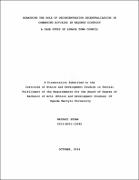| dc.description.abstract | The study was aimed at assessing the role of deconcentration Decentralization in combating HIV/AIDS in Kalungu District..The study objectives were; To find out the role of deconcentration in combating HIV/AIDS, To find out the extent to which deconcentration has helped in combating HIV/AIDS and To find out the solutions in improving the role of deconcentration in combating HIV/AIDS.
The study employed case study design approach using a quantitative and qualitative research paradigm to collect data from 56 (fifty six) respondents using structured questionnaires, and interviews.
The study found out that deconcentration helps in addressing the difficulties of trying to coordinate disparate HIV/AIDS activities; leads to greater accountability of health workers, improvement in Hospital/Health Sector through information asymmetry and also that it emphasizes a more rational and unified health service that caters to local preferences. Further, Deconcentration, it has helped to improve accountability, helps to shift parts of the workload, helped transparency and has improved efficiency of resource utilization and legitimacy. Improving the role of deconcentration in combating HIV/AIDS can be done through recruiting more medical personnel to fill the vacant posts by the local government and also that Health care providers have to be educated on the importance of involving beneficiaries in planning and managing health care delivery in combating HIV/AIDS.
The study was recommended that the management in conjunction with community leaders should have enlightenment to the local people about the importance of participation in health services It was also recommended that they should be appropriate technical and attitudinal training for service providers. The study also recommended that there is also a need to equip the community health centers with better equipment to treat patients | en_US |


